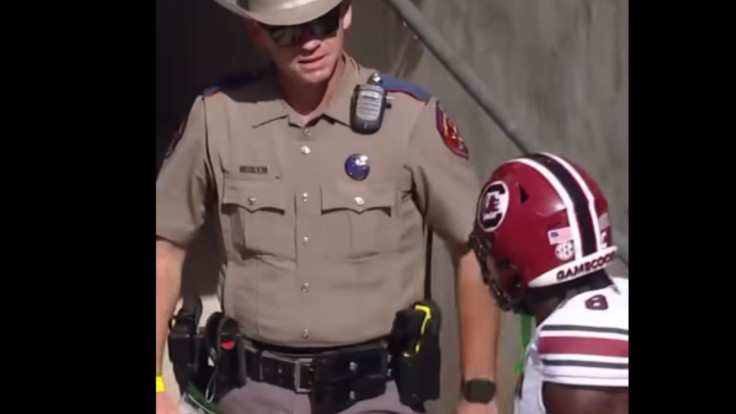'Premeditated and Corny': LeBron James Calls Out Texas Cop in Viral Confrontation With South Carolina's Nyck Harbor

KEY POINTS
- The confrontation sparked a wave of social media comments, scrutinising both the officer's and the players' actions.
- LeBron James' furious reaction intensifies scrutiny over the trooper's conduct.
A routine college football game between Texas A&M and South Carolina on Saturday, 15 November, descended into controversy after a Texas police officer made an aggressive gesture towards South Carolina player Nyck Harbor following a brief bump in the tunnel.
The moment, captured on video and rapidly circulated online, sparked debate about the trooper's conduct and whether law enforcement should be physically engaging with players in non-threatening environments.
LeBron James Speaks Out – and His Reaction Goes Viral
The incident took on an entirely new dimension when basketball superstar LeBron James publicly condemned the officer's behaviour, demanding accountability and swift disciplinary action.
Posting on X, James wrote: 'He went out his way to start some shit. Do better man.'
His blunt criticism amplified national attention, with many users echoing his concern over what they viewed as unnecessary escalation by law enforcement on the sidelines. James' intervention became one of the most shared elements of the discussion, reinforcing wider anxieties about the treatment of athletes by authorities.
That A&M cop needs to suspended! That was premeditated and corny AF!! 🤦🏾♂️. He went out his way to start some shit. Do better man
— LeBron James (@KingJames) November 15, 2025
Viral Video Sparks Outrage
Moments before the confrontation, Harbour had sprinted 80 yards for a touchdown and was returning to the tunnel alongside teammate Oscar Adaway III. As the pair made their way back, a uniformed trooper from the Texas Department of Public Safety (DPS) stepped directly into their path, physically blocking them and pointing forcefully.
The altercation, which lasted only seconds, quickly garnered millions of views. While security personnel are common at major college events, the trooper's actions were seen as excessively confrontational, raising questions over appropriate conduct in non-threatening situations.
Trooper Relieved of Duty as Investigation Begins
In a statement posted on X, the Texas DPS confirmed the officer had been removed from duty pending review.
'The DPS Trooper involved was sent home from the game. Our Office of Inspector General (OIG) is aware of the incident and will be further looking into the matter. No additional information will be released at this time,' the agency said.
Texas A&M separately confirmed the trooper was relieved of his assignment. Officials stressed that personnel are expected to follow strict professional conduct guidelines when interacting with athletes, coaches and spectators.
The Texas Department of Public Safety (DPS) is aware of the incident that occurred today during the Texas A&M football game. The DPS Trooper involved was sent home from the game. Our Office of Inspector General (OIG) is also aware of the incident and will be further looking into…
— Texas DPS (@TxDPS) November 15, 2025
Social Media Divides Over Responsibility
The viral clip fuelled intense debate across social media, with many users condemning the trooper's behaviour as disproportionate and unnecessary.
One user wrote, 'It read less like "protocol enforcement" and more like "personal vendetta against anyone having a moment."'
Another said, 'It's disheartening to see authority figures act in ways that escalate tensions instead of defusing them,' urging officials to hold the officer accountable.
Others highlighted broader concerns about policing, arguing that behaviour displayed on live television may reflect deeper issues during less visible encounters.
As one user put it: 'The trooper's conduct was clearly unacceptable. It raises serious concerns about how they act during traffic stops and other encounters with no cameras present.'
However, not all commenters agreed. Some defended the officer, arguing that the players' speed and momentum may have contributed to the encounter.
'He didn't do anything wrong. The players both shouldered him very harshly. What was he supposed to do?' one person wrote. Another called for retraining rather than termination.
A Moment That Has Sparked a Larger Debate
What began as a fleeting sideline confrontation has now become a national talking point, propelled by LeBron James' forceful reaction and a divided public. The investigation continues amid ongoing scrutiny of law-enforcement behaviour at sporting events and the broader question of how officers should conduct themselves around athletes.
© Copyright IBTimes 2025. All rights reserved.





















